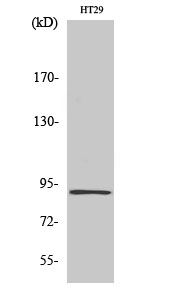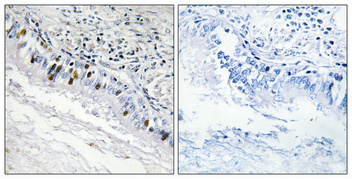InsP 3-kinase C Polyclonal Antibody
- Catalog No.:YT2354
- Applications:WB;IHC;IF;ELISA
- Reactivity:Human;Rat;Mouse;
- Target:
- InsP 3-kinase C
- Fields:
- >>Inositol phosphate metabolism;>>Metabolic pathways;>>Calcium signaling pathway;>>Phosphatidylinositol signaling system
- Gene Name:
- ITPKC
- Protein Name:
- Inositol-trisphosphate 3-kinase C
- Human Gene Id:
- 80271
- Human Swiss Prot No:
- Q96DU7
- Mouse Swiss Prot No:
- Q7TS72
- Immunogen:
- The antiserum was produced against synthesized peptide derived from human IP3KC. AA range:221-270
- Specificity:
- InsP 3-kinase C Polyclonal Antibody detects endogenous levels of InsP 3-kinase C protein.
- Formulation:
- Liquid in PBS containing 50% glycerol, 0.5% BSA and 0.02% sodium azide.
- Source:
- Polyclonal, Rabbit,IgG
- Dilution:
- WB 1:500 - 1:2000. IHC 1:100 - 1:300. ELISA: 1:10000.. IF 1:50-200
- Purification:
- The antibody was affinity-purified from rabbit antiserum by affinity-chromatography using epitope-specific immunogen.
- Concentration:
- 1 mg/ml
- Storage Stability:
- -15°C to -25°C/1 year(Do not lower than -25°C)
- Other Name:
- ITPKC;IP3KC;Inositol-trisphosphate 3-kinase C;Inositol 1;4,5-trisphosphate 3-kinase C;IP3 3-kinase C;IP3K C;InsP 3-kinase C
- Observed Band(KD):
- 102kD
- Background:
- This gene encodes a member of the inositol 1,4,5-trisphosphate [Ins(1,4,5)P(3)] 3-kinase family of enzymes that catalyze the phosphorylation of inositol 1,4,5-trisphosphate to 1,3,4,5-tetrakisphosphate. The encoded protein is localized to the nucleus and cytoplasm and has both nuclear import and nuclear export activity. Single nucleotide polymorphisms in this gene are associated with Kawasaki disease.[provided by RefSeq, Sep 2009],
- Function:
- catalytic activity:ATP + 1D-myo-inositol 1,4,5-trisphosphate = ADP + 1D-myo-inositol 1,3,4,5-tetrakisphosphate.,disease:Genetic variations in ITPKC influence susceptibility to Kawasaki disease [MIM:611775]; also known as mucocutaneous lymph node syndrome or infantile polyarteritis. Kawasaki disease is an acute, self-limited vasculitis of infants and children characterized by prolonged fever unresponsive to antibiotics, polymorphous skin rash, erythema of the oral mucosa, lips, and tongue, erythema of the palms and soles, bilateral conjunctival injection, and cervical lymphadenopathy. Coronary artery aneurysms develop in 15 to 25% of those left untreated, making Kawasaki disease the leading cause of acquired heart disease among children in developed countries.,enzyme regulation:Activated by calcium/calmodulin. Inhibited by high concentrations of the substrate Ins(1,2,4)P3, and allosterica
- Subcellular Location:
- Nucleus . Cytoplasm . Shuttles actively between nucleus and cytoplasm with both nuclear import and nuclear export activity. .
- Expression:
- Highly expressed in pancreas, skeletal muscle, liver, placenta and weakly in kidney and brain.
- June 19-2018
- WESTERN IMMUNOBLOTTING PROTOCOL
- June 19-2018
- IMMUNOHISTOCHEMISTRY-PARAFFIN PROTOCOL
- June 19-2018
- IMMUNOFLUORESCENCE PROTOCOL
- September 08-2020
- FLOW-CYTOMEYRT-PROTOCOL
- May 20-2022
- Cell-Based ELISA│解您多样本WB检测之困扰
- July 13-2018
- CELL-BASED-ELISA-PROTOCOL-FOR-ACETYL-PROTEIN
- July 13-2018
- CELL-BASED-ELISA-PROTOCOL-FOR-PHOSPHO-PROTEIN
- July 13-2018
- Antibody-FAQs
- Products Images

- Western Blot analysis of various cells using InsP 3-kinase C Polyclonal Antibody diluted at 1:2000

- Immunohistochemical analysis of paraffin-embedded Human lung cancer. Antibody was diluted at 1:100(4° overnight). High-pressure and temperature Tris-EDTA,pH8.0 was used for antigen retrieval. Negetive contrl (right) obtaned from antibody was pre-absorbed by immunogen peptide.

- Western blot analysis of lysates from HT-29 cells, using IP3KC Antibody. The lane on the right is blocked with the synthesized peptide.



